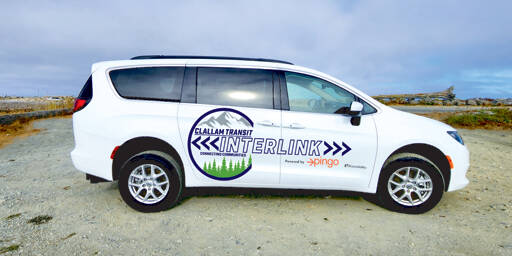A new on-demand van service in Sequim and Forks that will pick up riders at their homes and deliver them anywhere within a designated downtown area will begin on Dec. 12.
The service was unanimously approved by the Clallam Transit Authority board on Nov. 16 after a public hearing where no one online or in-person spoke out either for or against the microtransit service.
Called Interlink, it will replace two fixed routes, the Route 17 shuttle in Forks and the Route 40 shuttle in Sequim.
“It will operate very much like Uber or Lyft with passengers being able to preschedule a ride,” Clallam Transit operations manager Jim Fetzer said. Riders can order a same-day ride up to two hours in advance.
One Interlink van will serve about a 3-square-mile area of each town and operate the same hours as the route it replaces, with expanded service in Sequim on Saturdays.
Fares will be waived the first 30 days, as they are for all new Clallam Transit services, and afterward the fares will be the same as fixed-route options.
Each van can accommodate three passengers on foot and one wheelchair passenger or one foot passenger and two wheelchair passengers.
Clallam Transit engaged in a campaign of public outreach over the past few months by holding informational meetings in Sequim and Forks and speaking to service groups, among other efforts, to get the word out about the change.
“I attended the microtransit meeting in Sequim with my daughter, who is a disabled adult, and I was very impressed with the presentation,” board member Kathy Downer said.
“I think that once people get used to it, it will work out very well.”
Clallam Transit developed Interlink at the recommendation of a consultant who suggested a microtransit service could increase ridership. General Manager Kevin Gallacci said Interlink was created so it could be scaled up if demand increased.
“This will be a trial run for this type of service, and if it becomes overly popular, we have more vehicles and maybe we can extend the service area,” Gallacci said.
“And if it’s successful, there’s a lot of options out there for an electric vehicle that can easily operate in this type of service.”
To use the on-demand service, riders must download an app, called “Pingo,” to their iOS or Android device. The app allows riders to request, pay for and monitor the arrival time of their ride.
Those who do not have a smartphone or tablet can request a ride by calling 360-452-4511, opt. 6. This is also the number to call for questions about Interlink or for assistance using the app.
Grant for buses
In other action, the board authorized Clallam Transit in a vote of 3-2 to apply for a grant through the state Department of Transportation to purchase four diesel buses to replace buses that are near the end of their useful life at a cost of $2.7 million with a 20 percent match (about $544,716 in Clallam Transit funds). Those buses would be scheduled to be delivered in 2025.
Although Clallam Transit has committed to transitioning to hydrogen- and electric-powered buses, Gallacci said the leadership team decided purchasing four diesel buses was a more practical and financially responsible decision when Clallam Transit was unlikely to be prepared to support the technology, modify transit facilities, train staff and secure the funding needed for hydrogen or electric buses by 2025.
Downer, who voted against authorization, said using the grant to purchase diesel rather than opting for zero-emission buses was a missed opportunity.
“Given that we need to replace these vehicles sooner than we had anticipated, I do not think that we need to go with gasoline or diesel,” Downer said. “I think that we should remain committed to hybrid or any other type of energy except fossil fuels.”
Board member Brendan Meyer, who also voted against the authorization, said, “I think we need to move forward in the direction of electric because that’s the direction it’s eventually going to end up so we might as well start.”
Voting for approval were William Armacost, Mike French and Juanita Weissenfels. Board members Bill Peach, Mark Ozias and Lindsey Schromen-Wawrin were excused.
Gallacci noted that 10 paratransit vehicles that would be at the end of their usable lifespan in 2025 were expected to be replaced with vehicles using zero-emission technology.



